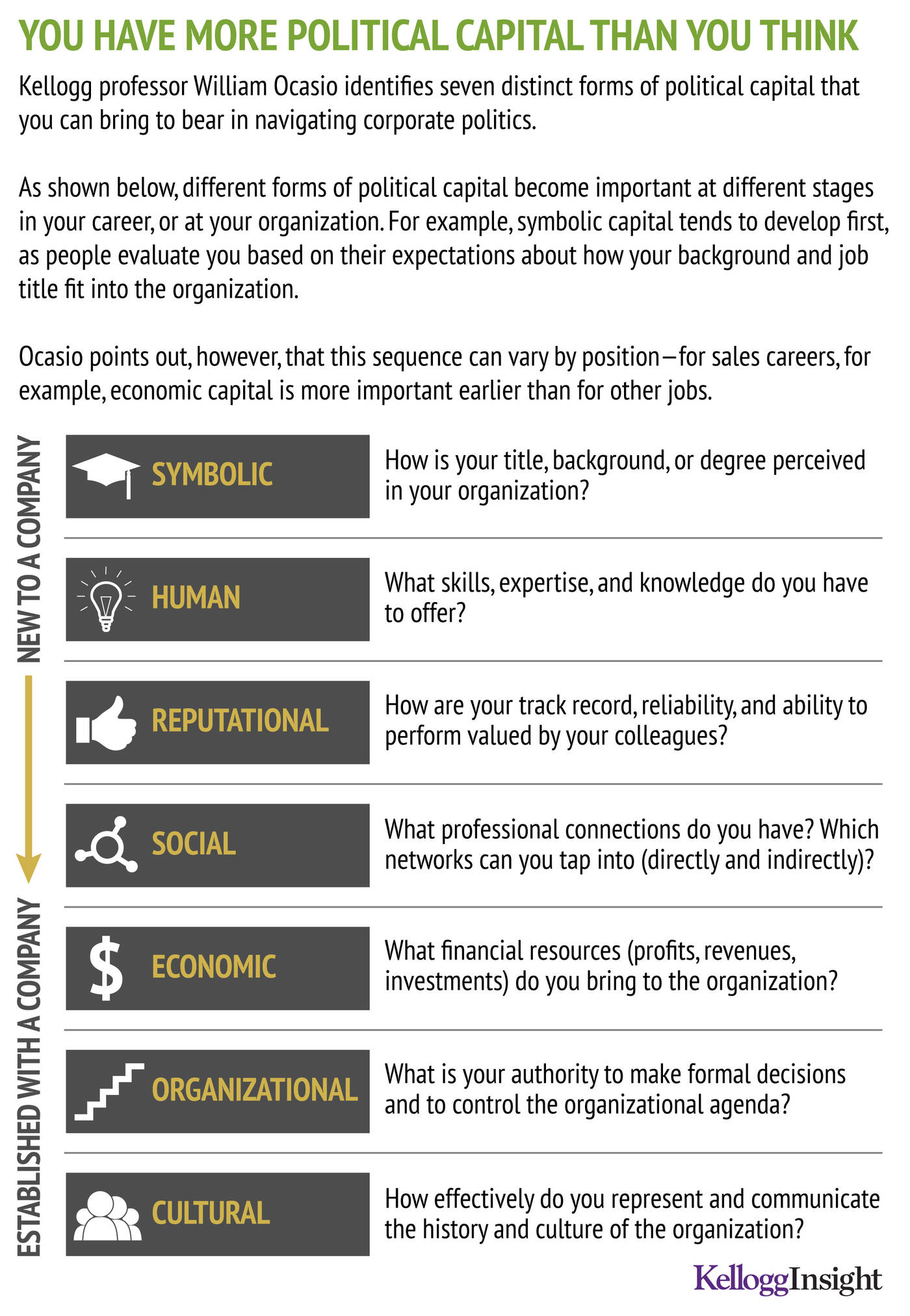Featured Faculty
William Ocasio was previously a member of the Management & Organizations faculty at Kellogg

Yevgenia Nayberg
Let’s face it: few of us relish navigating politics in the workplace. Even the phrase “corporate politics” evokes power-hungry managers plotting their rise to the top. So it may be no surprise that many of us prefer to avoid the fray, trusting that our performance alone will lead to success down the road.
But according to William Ocasio, a professor of management and organizations at the Kellogg School, there is more to organizational politics than Machiavellian schemes. In today’s knowledge economy, which has witnessed the steady breakdown of traditional hierarchies and functional silos, power has less to do with control and more to do with influence. We gain that influence by developing political capital.
“This is a different way of understanding how power works in organizations,” Ocasio says. “It’s not about coercing people—it’s about mobilizing political support. Leaders can’t accomplish their goals without a broad support base, which is why political capital is important for leaders.”
So what should you know about investing in—and utilizing—political capital? Ocasio offers four tips.
1. Don’t underestimate how much capital you have—or could have. “In the past twenty years we have come to better understand the importance of finding sources of political capital beyond the traditional corporate hierarchy,” Ocasio says.
Most managers recognize the value of social networks. But not all of them make a special effort to diversify. “Some people focus too narrowly,” he says, “or they underestimate the resources that are available to them.”

Building on his research and experience teaching business students and executives, Ocasio identifies seven distinct forms of political capital: human, social, reputational, economic, symbolic, organizational, and cultural. And these forms can work together symbiotically. By combining, say, the social capital of your network connections with the symbolic capital of your job title and the reputational capital of how your value is perceived within the organization, you allow each of these sources to feed off of each other.
To maximize your political capital, you need to look beyond the usual places—and sometimes even beyond your organization. “In order to do our jobs well, we are usually dependent on all kinds of people, whether we know it or not,” Ocasio says. “You need to find the critical actors that you will be dependent on—even peers who fall outside one’s industry or market. It’s subtle, but it’s still a valuable source of political capital.”
Diversifying is also useful because certain forms of capital may be more or less helpful to your job as it evolves. “When moving into a new role, most people use the sources of political capital they’ve used in the past,” Ocasio says. “But that’s not necessarily going to help you succeed at the next level. You can’t rely exclusively on past experience for how to approach your new position.”
The political capital one needs to be an effective Product Manager is different from the kind one needs to be a senior marketing director or a CMO. When leaders falter after promotion, it is often because they continue to rely on forms of political capital that helped them get where they are and fail to develop and employ new ones.
2. Build reputational capital early. In the knowledge economy, few sources of political capital are as valuable as reputation. A good reputation generates buzz, which can have the effect of feeding on itself. But the opposite can also be true.
“You either set off the virtuous cycle or the vicious cycle,” Ocasio says. Have a positive reputation? You are more likely to receive endorsements and greater support, which leads to more opportunities, which can boost confidence, improving your well-being and enhancing your performance.
Reputational capital also creates confirmation biases. “Once your positive reputation’s in place, people tend to give you credit when things go well and not to blame you even if things go wrong or you make mistakes.”
So what should you do to set yourself up for the virtuous, and not the vicious, cycle? Ocasio recommends negotiating first assignments that are likely to yield success, communicating your contributions, and building relationships with formal and informal reputation brokers.
“You need to understand which sources of political capital are truly valued in your organization.”
3. Invest in political capital before you need it. “Every organization encounters uncertainty, crises, and unexpected events,” Ocasio says. “The higher you rise, the more you will have to deal with nonroutine situations.”
It may be difficult to know in advance which type of political capital you may need to tap in a given situation, but developing political capital early in your career puts you in a better position to deal with challenging situations down the road.
Paul Rusesabagina, an assistant hotel manager, relied on his knowledge, reputation, and social capital to protect refugees during the 1994 Rwandan genocide—a story made famous by the movie Hotel Rwanda. “This was a case of a middle manager who had developed political capital well before he was presented with a terrible life-or-death crisis,” Ocasio says. Leveraging his capital with key allies, including his relationship with a key general, helped him save hundreds of lives.
4. Read your organization’s culture. “It’s extremely important to understand what’s valued at a given organization,” Ocasio says. “On the one hand, you want to diversify—this will be good for you in the long run—but in the short and medium term you need to understand which sources of political capital are truly valued in your organization.”
Consider the question of when to leverage certain kinds of symbolic capital, such as titles or advanced degrees. There are advantages and disadvantages to drawing upon these source of capital; sometimes advertising a particular status or affiliation might work against you.
“Jack Welch doesn’t tell people he has a Ph.D. because, in the business world, academics are sometimes considered pie-in-the-sky,” Ocasio says. “But if you’re a medical doctor, you will always sign your name with that title.” The symbolic capital of “M.D.” is, at least in the health care sector, unambiguously positive.
While building political capital, it is also worth keeping in mind that notions of power are changing in many workplace cultures. The traditional view—that power means having control over a group of people—is giving way to a new understanding: that power means having other people identify with you. Study after study has shown the effects of homophily: people like to associate—and are likely to respect—those who are similar to them. So emphasizing points of common ground can help you build capital.
But leaders should also keep in mind that it pays to build political capital with some people more than others. “Ultimately, you want to be able to mobilize political support,” says Ocasio. “To do this effectively, you always have to target the key players. Power, after all, is not just a talent for getting people to like you; instead, it is the capacity to convince those around you to act in ways that support your goals.”